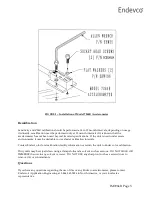
IM7264B, Page 1
®
INSTRUCTION MANUAL
For Model 7264B Piezoresistive Accelerometer
IM7264B, Revision D
The Model 7264B is a low mass, miniature piezoresistive accelerometer. Because of its small size, certain
precautions must be observed when handling and mounting the accelerometer to avoid damaging the
unit.
Materials Required
All materials used in the mounting of the accelerometer are supplied with the unit in the shipping
container. These materials include:
(1) Allen Wrench for 0 - 80 screws - Endevco P/N EHM35
(2) Size 0 flat washers - Endevco P/N EHW196
(2) 0 - 80 x 3/16 inch socket head cap screws - Endevco P/N EH828
Special Precautions
The following precautions should be observed when handling and mounting the accelerometer.
• CAUTION- Avoid dropping the accelerometer or striking the unit against hard surfaces. Keep the
protective sleeve that is supplied with the unit, on until the unit is installed.
• CAUTION- When mounting the unit, do not over torque the screws. The specified mounting torque of
2.6 in-lbf (0.29 N-m) recommended, 3.0 in-lbf (0.34 N-m) maximum is easily achieved with the provided
Allen wrench. Excessive torque may result in damage to the unit. Do not use snap type torque wrenches.
Check-out
Upon receipt of the accelerometer, it should be checked to insure proper operation. Three simple tests
can be conducted without removing the unit from its shipping container and protective sleeve.
1. Impedance test - Open the accelerometer shipping box and unwind a few inches of cable. Leave the
accelerometer in the container. Read the input impedance (Red to Black) and output impedance (Green
to White) with an ohmmeter. Refer to the accelerometer Calibration Data Sheet to determine the proper
value of impedance. The measured impedance should be within ±25% of this calibrated value.
2. Insulation Resistance- If the input and output impedance's are within acceptable limits, use a
multimeter, ohmmeter or megohmmeter set at 50 volts maximum. Measure the insulation resistance
between:
a. all leads connected together and the cable shield
b. all leads connected together and the transducer case
c. cable shield and the transducer case
All three readings should be 100 megohms minimum.





















